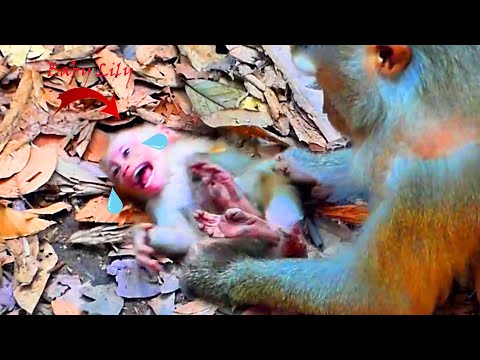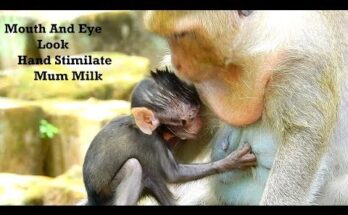
Strong discipline delivered by a mother monkey is not always easy to witness, especially when it’s directed at a newborn. Deep within the forest, where survival depends on instinct and lessons are often learned through pain, a heartbreaking scene unfolded. A tiny, soft-bodied baby monkey had refused to nurse—whether from confusion, weakness, or stubbornness, no one could be certain. What followed, however, was a powerful moment of maternal response that left the baby trembling and crying in despair.
The mother, sensing the baby’s refusal as a sign of defiance or danger to its survival, reacted swiftly. With a firm grip and stern posture, she tried once more to pull the infant close, encouraging it to latch. But the baby turned its face away, whimpering faintly. It was then that the mother’s demeanor changed. Her body tensed, eyes narrowed, and her nurturing warmth turned into strict action. She pushed the baby away momentarily—perhaps to shock it into realizing the seriousness of the situation.
Her tail lashed slightly behind her, a visible sign of frustration and urgency. Again, she grabbed her little one, this time not as gently. Her actions were not cruel, but unquestionably firm. She nipped at the baby’s soft limbs—not to injure, but to discipline, to jolt the baby’s instincts back into gear. The cries that followed echoed through the trees, thin and high-pitched, the desperate wails of a confused and frightened newborn unsure why its mother had suddenly turned so strict.
Nearby monkeys paused and glanced toward the sound but did not interfere. This was a private and necessary moment between mother and child, part of the natural process of growth. The forest has no room for prolonged softness. A baby that refuses to nurse could grow weaker by the hour, becoming vulnerable to predators, disease, or abandonment. The mother’s reaction, though harsh in appearance, was born of fear and love.
After the discipline, the baby crawled slowly back toward its mother. Tears still clung to its tiny lashes, and its body shook with quiet sobs. The mother watched carefully, her stern eyes softening just slightly as the baby reached her chest again. She did not move right away, letting the infant make the choice. This time, the little monkey latched on, albeit hesitantly. The mother held her breath for a second before finally wrapping her arms around her baby again.
It was a fragile peace, but a vital one.
This interaction was more than just a correction—it was a life lesson. In the wild, even love wears a hard edge. The cries that followed the mother’s discipline may have sounded heartbreaking to human ears, but they were a necessary part of survival. The bond between mother and baby would continue, perhaps even strengthened by this moment of tough love. And as the baby finally drank the milk it had refused before, the forest quieted once more, the harshness of reality momentarily soothed by the warmth of a mother’s embrace.


